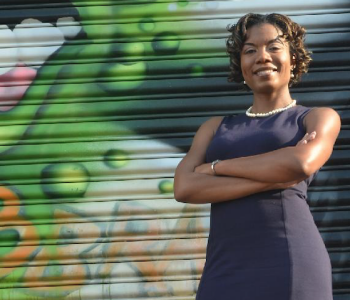Finding Success in Field Science

“In geology, like a lot of other field sciences, women are making great progress in getting in, but as you go up the ladder … the numbers dwindle,” says professor and researcher Beverly Goodman. “Field sciences are the most vulnerable to that loss.”
Goodman attributes her comfort in nature to her time at Girl Scout camp. “If you have those experiences growing up, it helps you feel comfortable about what you’re doing [later in life].”
Today as a marine geologist, Goodman is often asked if she grew up
near the ocean. She didn’t, though she spent a lot of her childhood at
lakes and on boats. She was a Girl Scout Brownie, Cadette, and Junior
in Cincinnati, Ohio, where she loved everything about her Girl Scout
camp experience—from getting out on the water, to singing, to
experiencing platform tents and dining room rituals.
She
also has fond memories of exploring caves in her youth. “I can still
picture walking down into the gorge and seeing all the fossils for the
first time,” she recalls.
After growing up in the Midwest, Goodman relocated to Israel as an archeology, anthropology, and geology student and ended up staying. These days, she teaches and does field research in marine geology.
“My work in the field is very physical. I’m diving and doing cruises offshore on research ships, and excavations on land and underwater. Some of my work gets me into caves underwater and on land,” she says, noting the combined physical and mental nature of her work.
Through the years, Goodman has been excited to see more women studying science, although she’s been disappointed at the low advancement rate. For one, the isolation of field work has proven to be “a bad recipe for harassment,” in her words.
“Today, I’m a professor and I am advancing—and I get to determine the field conditions, even down to what the rules are for consenting relationships on a three-week trip.”
She also points to the demands of family life combined with the demands of field work as a limiting factor for women with children, many of whom find it difficult to leave for weeks or months at a time.
Goodman is married to another scientist, and they have children but find ways to make it work. She often chooses research that doesn’t require her to be away for months, and when her kids were younger she paid out of pocket so they could travel with her.
“There were no grants for bringing a nanny, or for a car to [accommodate] kids.”
Goodman’s passion for her career is clear.
“A life in the sciences is really rewarding. It can be stimulating and financially rewarding,” she says. She also talks about the thrill of discovery.
“My main discovery was recognizing tsunami deposits from the eruption of Santorini 3,500 years ago. I found deposits in Israel that showed just how big the tsunami was. It got 400 miles away from the volcano,” she says.
“It’s so exciting because the clues, the hints, the pieces of the puzzle are everyday things—shells, grains of sand—but because you can use scientific methods to see where they came from, it’s like being a time traveler.”





